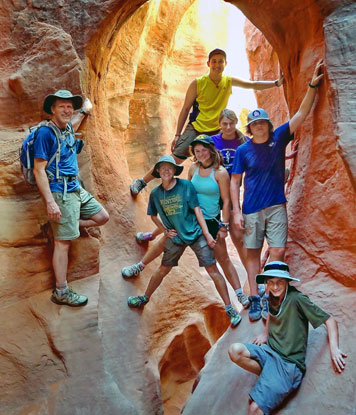Dr. Jeffrey Marion - Celebrating 50 Years of American Wilderness

Jeff Marion is adjunct professor in natural resource recreation in the Department of Forest Resources in the College of Natural Resources and Environment at Virginia Tech and recreation ecologist with the U.S. Geological Survey.
He can be contacted at 540-231-6603; jmarion@vt.edu; Cheatham Hall, Room 304F; 310 West Campus Dr.; Blacksburg, VA 24061.
Jeff grew up exploring the woods, streams, and caves of Kentucky. An avid outdoor recreationist, naturalist, and Eagle Scout, he spent summers teaching backpacking and climbing skills while majoring in Biology at Wittenberg University. With M.S. and Ph.D. degrees in Recreation Resources
Management from the University of Minnesota (1982/84), he began his career as a National Park Service Research Biologist in 1985. He moved to the Virginia Tech College of Natural Resources in 1989 to establish a Cooperative Park Studies Unit. He was transferred to the U.S. Geological Survey in 1997, but continues his research in recreation ecology studies from Virginia Tech.
Jeff works with graduate students in his research program. Studies have investigated recreation impacts to campsites, trails, and cliffs, and the efficacy of educational and site management actions designed to avoid or minimize visitor impacts. For more than 13 years Jeff has led a co-ed Venture
Crew of high school youth on outings that include backpacking, rock climbing, caving, canoeing/kayaking, and canyoneering.
Leave No Trace - Leave No Trace is a decades-old education program that aids land managers in avoiding or minimizing visitor impacts to America’s
treasured landscapes. Marion was a founding member of the Leave No Trace board of directors and spent a decade as chair of the Educational Review Committee, helping to develop Leave No Trace principles, low impact outdoor practices, courses, and educational materials. Marion’s 2014
book, Leave No Trace in the Outdoors, is a resource to the National Park Service, Bureau of Land Management, Fish and Wildlife Service, U.S. Forest Service, outdoor organizations, and the general public for how to enjoy the outdoors while protecting it from visitor use impacts. “Leave No Trace is about making ethical decisions to protect the natural environments that we all love,” Marion says.
Research - His more than 30 years of recreation ecology research to measure the impact of millions of visitors on America’s parks, forests, and wildlife refuges began with his doctoral research on the environmental impacts of camping in the Boundary Waters Canoe Area Wilderness. Now he works with graduate students as he conducts recreation ecology research and develops science-based management strategies for reducing visitor impacts without reducing the joy of experiencing the out of doors.
Back to the Boundary Waters - To commemorate the 50th anniversary of the Wilderness Act, Marion headed back in the summer of 2014 to the Boundary
Waters Canoe Area Wilderness to measure 100 of the area’s 2,200 campsites – the same ones he measured in 1982. He examined soil and vegetation impacts and tree damage and regeneration to assess campsite sustainability. Results were published in two journal papers and presented at a National Wilderness Conference held to celebrate the Wilderness Act’s anniversary.
Research on the National Trails System - In 2015, Marion and Virginia Tech doctoral alum Jeremy Wimpey began a four-year study to characterize and help reduce the impact of millions of Appalachian Trail hikers on the trail tread, campsites, and shelters. Fieldwork was completed in 2017 and analyses to evaluate the sustainability of trail alignments, camping locations, and management practices are currently underway. Marion and Wimpey initiated a similar multi-year study of camping impacts and sustainable camping management practices for the Pacific Crest Trail in 2016, with support from the national interagency Aldo Leopold Wilderness Research Institute.
Wilderness Science Video - A video named “Wild Science: Wilderness and Recreation” developed by the Aldo Leopold Wilderness Research Institute highlights the benefits of Marion and Wimpey’s recreation ecology research in wilderness settings: http://leopold.wilderness.net/default.php
Video highlights the benefits of Marion and Wimpey’s recreation ecology research in wilderness settings:
http://leopold.wilderness.net/default.php




Buy Leave No Trace in the Outdoors - The essential guide book for enjoying the outdoors without harming the environment.
Details the seven core principles of Leave No Trace ethics and practices
Covers hiking, campfires, food storage, and personal hygiene.
Endorsed by the USDI National Park Service, Bureau of Land Management, Fish & Wildlife Service, U.S. Geological Survey, and the USDA Forest Service.


